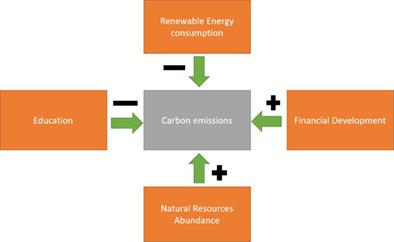当前位置:
X-MOL 学术
›
Sustainable Development
›
论文详情
Our official English website, www.x-mol.net, welcomes your
feedback! (Note: you will need to create a separate account there.)
The linkages among natural resources, renewable energy consumption, and environmental quality: A path toward sustainable development
Sustainable Development ( IF 9.9 ) Pub Date : 2020-11-27 , DOI: 10.1002/sd.2151 Muhammad Wasif Zafar 1 , Asif Saeed 2 , Syed Anees Haider Zaidi 3 , Abdul Waheed 4
Sustainable Development ( IF 9.9 ) Pub Date : 2020-11-27 , DOI: 10.1002/sd.2151 Muhammad Wasif Zafar 1 , Asif Saeed 2 , Syed Anees Haider Zaidi 3 , Abdul Waheed 4
Affiliation

|
The role of education is inevitable in the process of societal reform and achieving sustainable development. Sustainable development remains unachievable without advancing the environmental quality. It is noteworthy to explore the relationship between natural resources, renewable energy consumption, and environmental quality. The current study analyzes the impact of renewable energy use, natural resources abundance, and education on environmental quality by controlling the role of financial development and economic growth within selected Asian countries from 1990 to 2018. The study focuses on second‐generation unit root and co‐integration methods that control the heterogeneity in the data. Empirical results inferred that any expansion in education rate and renewable energy enhances environmental quality. Natural resource abundance increases the level of carbon emissions. The results of Dumitrescu and Hurlin panel causality ensure a bidirectional link between financial development and emissions as well as renewable energy and emissions. The findings furnish important policy implications by furnishing empirical evidence from Asian countries.
中文翻译:

自然资源,可再生能源消耗和环境质量之间的联系:通往可持续发展的道路
在社会改革和实现可持续发展的过程中,教育的作用是不可避免的。如果不提高环境质量,就无法实现可持续发展。值得探讨的是探索自然资源,可再生能源消耗与环境质量之间的关系。本研究通过控制1990年至2018年部分亚洲国家在金融发展和经济增长中的作用,分析了可再生能源的利用,自然资源的丰富度和教育对环境质量的影响。用于控制数据异质性的集成方法。实证结果表明,教育率和可再生能源的任何增长都可以提高环境质量。自然资源丰富增加了碳排放水平。Dumitrescu和Hurlin面板因果关系的结果确保了金融发展与排放以及可再生能源和排放之间的双向联系。通过提供来自亚洲国家的经验证据,该发现提供了重要的政策含义。
更新日期:2020-11-27
中文翻译:

自然资源,可再生能源消耗和环境质量之间的联系:通往可持续发展的道路
在社会改革和实现可持续发展的过程中,教育的作用是不可避免的。如果不提高环境质量,就无法实现可持续发展。值得探讨的是探索自然资源,可再生能源消耗与环境质量之间的关系。本研究通过控制1990年至2018年部分亚洲国家在金融发展和经济增长中的作用,分析了可再生能源的利用,自然资源的丰富度和教育对环境质量的影响。用于控制数据异质性的集成方法。实证结果表明,教育率和可再生能源的任何增长都可以提高环境质量。自然资源丰富增加了碳排放水平。Dumitrescu和Hurlin面板因果关系的结果确保了金融发展与排放以及可再生能源和排放之间的双向联系。通过提供来自亚洲国家的经验证据,该发现提供了重要的政策含义。









































 京公网安备 11010802027423号
京公网安备 11010802027423号